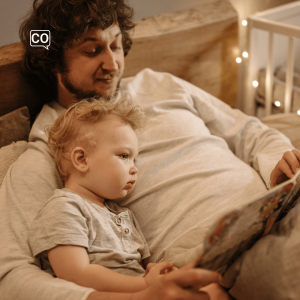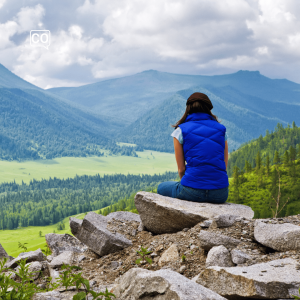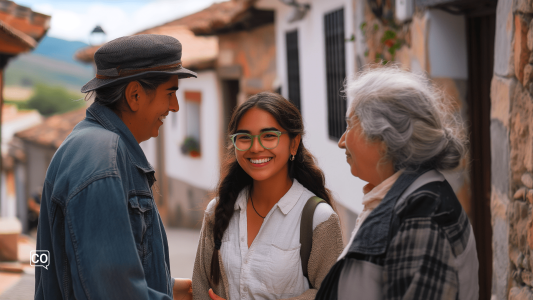Saludos y Despedidas

Learning goals:
- Saludos básicos y despedidas. (Basic greetings and farewells.)
- Los pronombres personales (de sujeto) (Personal Pronouns (Subject))
- Saludos - informales y formales (Greetings - informal and formal)
Learning module 1 (A1): Presentarse (To introduce oneself)
Teaching guidelines +/- 60 minutes
Core vocabulary (14)

Yo me despido de mis abuelos antes de viajar.
(I say goodbye to my grandparents before traveling.)
Despedirse
(To say goodbye)

Hola, soy Juan, encantado de conocerte.
(Hello, I am Juan, nice to meet you.)
Encantado
(Nice to meet you)
Listening materials
Our listening materials implement the verbs, vocabulary and grammar topics of this lesson. Audio and video available!
A1.1.1 Gramática: Los pronombres personales (de sujeto)
Spanish A1.1.1 Personal Pronouns (Subject)
(Subject personal pronouns in Spanish indicate who performs the action in a sentence.)
Teaching guidelines +/- 15 minutes
A1.1.2 Cuento corto: Los saludos de Juan
Spanish A1.1.2 Juan's greetings
En esta breve historia, conocemos los distintos saludos de Juan.
(In this short story, we learn about the different greetings of Juan.)
Teaching guidelines +/- 15 minutes
A1.1.3 Cultura: Saludos - informales y formales
Spanish A1.1.3 Greetings - informal and formal
Aprende sobre los saludos formales e informales en España
(Learn about formal and informal greetings in Spain)
Teaching guidelines +/- 10 minutes
Exercises
These exercises can be done together during conversation lessons or as homework.
Exercise 1: Find the words
Instruction: Find the words, mark them and make sentences with the words.
Show answers Show hintsHints
To be , To be , Hello , How are you? , Thank you , Good morning
Answers
Score: 0/6
| ¿Qué tal? | (How are you?) |
| Hola | (Hello) |
| Estar | (To be) |
| Ser | (To be) |
| Gracias | (Thank you) |
| Buenos días | (Good morning) |
Exercise 2: Reorder sentences
Instruction: The words in these sentences have been shuffled! Sort them so that they make a valid sentence again and translate.
Show answers Show translationExercise 3: Translate and make sentences
Instruction: Translate the words and phrases below and use it in a conversation or text.
Show answersExercise 4: Translate and use in a sentence
Instruction: Translate and say the word out loud. Use the word in a sentence.
Show translation|
1.
Hasta luego
|
(See you later) |
|
2.
Encantado
|
(Nice to meet you) |
|
3.
Buenas tardes
|
(Good afternoon) |
|
4.
Buenos días
|
(Good morning) |
|
5.
Despedirse
|
(To say goodbye) |
Exercise 5: Conjugación verbal
Instruction: Choose the correct word, read the sentence out loud and translate.
Show answers Show translationEstar (Presente, indicativo), Ser (Presente, indicativo)
1. Vosotros ... estudiantes.
2. Él ... mi amigo.
3. Ellos ... de vacaciones.
4. Nosotros ... felices.
5. Ellos ... doctores.
Exercise 6: Personal Pronouns (Subject)
Instruction: Choose the correct word, read the sentence out loud and translate.
Show answers Show translationNosotras, Ella, Yo, Vosotros, Él, Tú, Ellos, Nosotros
1. ... es mi amiga.
2. ... eres mi amigo.
3. ... es simpático.
4. ... son hermanos.
5. ... hablo español.
6. ... hablamos español.
7. ... somos amigas.
8. ... sois estudiantes.
Exercise 7: Translate and make sentences
Instruction: Translate the words and phrases below and use it in a conversation or text.
Show answersConversation exercise
Teaching guidelines +/- 10 minutes
- Cada estudiante dice el saludo de cada imagen. (Each student says the greeting of every picture.)
- Da un saludo formal y uno informal. (Give both a formal and informal greeting.)
Example phrases:
- Hola (informal) o Buenos días (formal). (Hello (informal) or Good morning (formal).)
- ...
Appendix 1: Extended vocabulary table
Core vocabulary
(14):
Verbs: 3,
Interjection: 9,
Sentences / word combination: 2
Context vocabulary:
5
| Spanish | English |
|---|---|
| Adiós | Goodbye |
| Besos | Kisses |
| Buenas noches | Good evening |
| Buenas tardes | Good afternoon |
| Buenos días | Good morning |
| Cómo estás | How are you? |
| Damos la mano | We shake hands |
| Despedirse | To say goodbye |
| Encantado | Nice to meet you |
| Estar | To be |
| Gracias | Thank you |
| Hasta luego | See you later |
| Hola | Hello |
| Nos vemos | See you |
| Saludos | Greetings |
| Ser | To be |
| Un placer | A pleasure |
| ¿Cómo estás? | How are you? |
| ¿Qué tal? | How are you? |
Appendix 2: Verb conjugation tables for this lesson
Ser (to be)
Exercises and examples phrases
- yo soy I am
- tú eres you are
- él/ella es He is
- nosotros/nosotras somos we are
- vosotros/vosotras sois you all are
- ellos/ellas son they are
Estar (to be)
Exercises and examples phrases
- yo estoy I am
- tú estás You are
- él/ella está he is
- nosotros/nosotras estamos we are
- vosotros/vosotras estáis you are
- ellos/ellas están They are
Exercise: Verb conjugation
Instruction: Choose the correct word, read the sentence out loud and translate.
Show answers Show translationEstar (Presente, indicativo), Ser (Presente, indicativo)
1. Vosotros ... estudiantes.
2. Él ... mi amigo.
3. Ellos ... de vacaciones.
4. Nosotros ... felices.
5. Ellos ... doctores.














